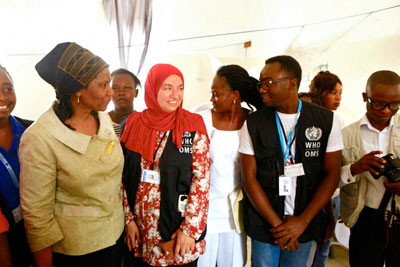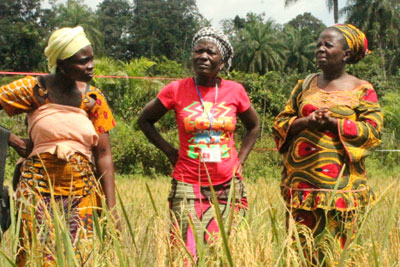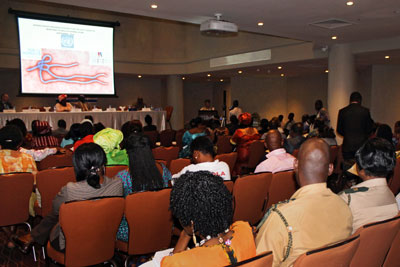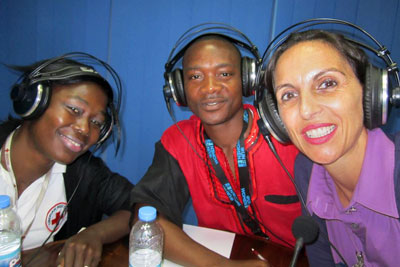UN Women action to confront the Ebola crisis
Date:
Since the Ebola outbreak in West Africa was declared an international public health emergency in August, many UN organizations have been working hand-in-hand to help those affected on the ground. UN Women has been facilitating mobilization and information efforts targeting women, who have been disproportionately affected by this disease, coordinating UN efforts to address gender within the response, and supporting the collection of sex-disaggregated data. To help curb the spread of Ebola and mitigate its impacts, UN Women has focused on supporting sensitization and advocacy on Ebola and its gender dimensions primarily in Liberia and Sierra Leone, but with some efforts in Nigeria, where we are making relevant materials available in local languages.
Efforts and programmes in Liberia and Sierra Leone include: working with local radio stations and with traditional leaders to raise awareness and aid prevention; producing educational materials to train health workers; supporting orphaned children and stigmatized survivors; ensuring that women’s needs are reflected in all aspects of the UN’s humanitarian response; providing economic grants for hard-hit cross-border traders; and more.
Read some of our impact stories:
Restoring confidence in the health facilities in Sierra Leone
On the last leg of her three-day visit to Sierra Leone, on 24 March UN Women Executive Director Phumzile Mlambo-Ngcuka launched the UN Women-supported Mano River Union First Ladies Initiative on Maternal and Reproductive Health Services at the Kenema District Government Hospital, which aims to put essential services back on track and restore eroded confidence in health services.
In Liberia, mobile banking to help Ebola-affected women traders
Since the Ebola outbreak began, prevention measures while addressing health concerns, have taken a drastic toll on the livelihoods and economic security of women traders in Liberia. In a country where approximately 85 per cent of daily market traders are women, closed markets and travel restrictions are causing a significant drop in sales. As a result, many are defaulting on repayment of the loans they used to invest in various businesses. To address the issue, UN Women and the Central Bank of Liberia have partnered to provide some 2,500 women cross-border traders with cash transfers via mobile technology, in order to help them save and expand their businesses.
UN launches Ebola Gender Mainstreaming Strategy in Sierra LeoneDespite growing evidence of women’s increased risk of contracting Ebola, especially due to traditional caregiving roles, there remains a lack of communication and outreach services specifically targeting women in the humanitarian response. To ensure the needs of women and girls are addressed within the UN’s overall response to the Ebola Virus Disease, the UN Country Team in Sierra Leone launched the Ebola Gender Mainstreaming Strategy, as developed by UN Women in early October. The Strategy calls for women’s participation in the Ebola response, better collection and use of sex disaggregated data, and re-establishing trust in public health services.
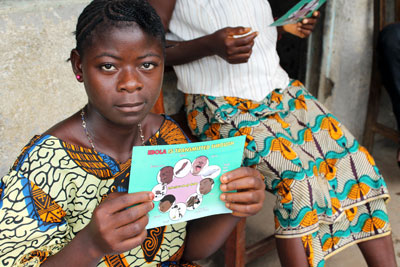
Women mobilize to halt the spread of Ebola in Sierra Leone
As of 2 December, the WHO has accounted for 1,583 Ebola-related deaths and 7,312 cumulative cases of infection. With the support of UN Women, nearly 29,000 women and men volunteers travelled to remote villages to provide education about prevention and collect information about the impact on women. UN Women has also been working on educational materials on Ebola, to help train health workers, and is refurbishing former rehabilitation centres to accommodate many of the 1,423 Sierra Leonean children who have been orphaned, as well as nurses who have been stigmatized because of their contact with patients.
At the front lines, Liberian women adopt new strategies in Ebola responseIn Liberia, the Ebola outbreak has not only taken lives, but has left survivors to grapple with the emotional and psychological effects, as well as stigmatization. To address the gender dimension of the Ebola crisis in this context, UN Women is supporting radio programmes that provides psychosocial help to patients, health workers, the public, and particularly women; training women in community-based Ebola awareness and prevention; and is working with local leaders and the Government of Liberia to scale up prevention, awareness-raising and contact-tracing efforts.
